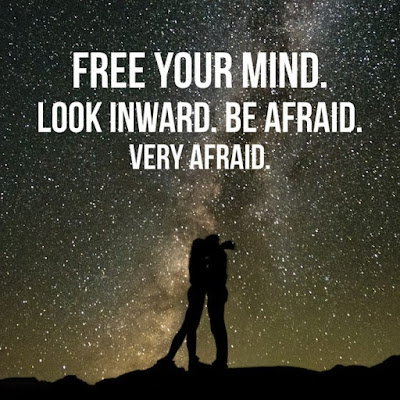 |
| Who knows what horror lurks in the hearts of men? Inspirobot knows! |
Online games, to some degree, can emulate this environment. Depending on the preparation time, an online game can provide a lot of tools an enterprising referee can use to emulate most things you could do on the table. Maybe even a few more cool tricks that parrot video game tropes are available, but any online game that makes use of maps and tokens can be very similar to a tabletop environment.
Certain types of game demand something a little different to evoke certain themes and moods. For example, when running investigation or horror games, there usually isn't much call to actually set up miniatures. A scene could be set through nothing but exposition, description and following up with dialogue. The actual physical play area has a lot more to do with making this kind of game or scene work than anything you can put on the table, as much of the action happens in the 'mind's eye'. It's more about interaction with the themes and the feeling you can produce in the player. Visual aids are usually employed such as illustrations or pictures of objects, characters and places - but these will only 'aid' the setting of the scene in the player's mind, and are not 'interacted' with like objects, miniatures or maps.
Dialogue and 'description' heavy scenes, in my opinion, are best played without any map or miniatures. Having too many objects 'defined' during these interactions can be counter-productive as the smallest and most insignificant inclusion can completely captivate players. This can be of great detriment to whatever you, as referee, may have intended. Visual cues are almost mandatory in an online game to set the scene and obtain some of that precious player attention you're going to need to run the game.
Interestingly, I find that because you're not in the physical space with your players it can be difficult to really make these scenes stick in an online game. Roleplaying at the table will incorporate all sorts of body language such as facial expression and hand gesticulations and this can help focus attention around the table during the game. Online, in many cases you won't see any faces and all cues given are through voice chat, which can really hinder the impact (or even the message the players can receive) from any convoluted dialogue or hints you may drop.
 |
| You'll need a LOT of image assets. |
Another problem online is that you can't control the space of your players, meaning all sorts of other things will probably be commanding their attention at times and you won't even realize until after the fact - if at all. If I'm running a game at the table, I make sure the room is dark and Spartan as possible to remove all distractions. Some background music helps a lot, but that's something you can only really control at the table rather than online (although you can make suggestions).
Bearing all this in mind, there are very few games that will be played entirely on the table. I almost always include these sorts of scenes in every game, to a greater or lesser degree. In fact, some games almost CANNOT be played with miniatures in most cases, and you will only break them out once or twice in years of playing - and even then, you may find it's not warranted. By contrast, some games will be almost entirely on the table, with full terrain and miniature monsters and traps and other such.
I'll be running online games for the foreseeable future, due mostly to the absurdly deteriorating timeline in which I inhabit. It's not all bad - I can do some things here that I can't do on the table. Eventually, I'll be back on a proper battlefield...but until then we'll have to learn what works and what doesn't.
Make use of the tools you've got, and and it's easy evolve the game into something that is enjoyable. Do what you can, while you can. You can rest assured that the toolset and circumstances will change in the future, whether you like it or not.

No comments:
Post a Comment
What do you think about that?